Customer Experience
10 Excellent Ways AI Will Improve Customer Experience in 2025
Article written by Jaby K J
Growth Marketer at SurveySparrow
15 min read
20 November 2025

Remember TARS & CASE from the movie “Interstellar“? Or even the cute “Samantha” from Joaquin Phoenix’s movie “Her.”
I reckon, you do! We’ve all been exposed to AI, aka Artificial Intelligence, through a lot of movies.
But you know what? AI—once a futuristic concept limited to sci-fi movies, is no longer under the imaginative radar. It has become a pivotal tool for business by changing the customer experience landscape. As large and small businesses continue to acknowledge the importance of customer experience as a differentiator, AI has moved from being a nice-to-have element to an integral part of business strategy.
AI is now revolutionizing customer experience in all the businesses ahead! Please don’t take my word for it. It’s out there for you to see!
A McKinsey report suggests that artificial intelligence could contribute a remarkable $25.6 trillion to the global economy.
Read more about the report here:
So, how exactly is AI enhancing customer experience? In what ways is this advanced technology turning customer interactions into unique experiences that foster loyalty and drive growth?
If you’ve been pondering these questions, this blog post is for you, and you’ll find:
- What is AI Customer Experience?
- McKinsey Report on AI in Customer Experience
- 4 Finest AI Customer Experience Examples
- Top 10 Ways AI Can Improve Customer Experience
- Future of AI in Customer Experience
- How SurveySparrow’s AI is Enhancing Customer Experience
What is AI Customer Experience?
Artificial Intelligence (AI) Customer Experience involves harnessing the power of AI technologies to augment customer interactions, streamline business operations, and ultimately bolster overall customer satisfaction. The technologies deployed in this approach range from machine learning algorithms to natural language processing (NLP), predictive analytics, and even robotic process automation.
AI facilitates a highly personalized customer experience by sifting through large volumes of customer data, including browsing patterns, purchase history, and social media behavior. This capacity for in-depth analysis enables businesses to discern individual customer preferences, thus tailoring their recommendations and interactions to cater to these specific tastes and needs.

Interested in integrating AI into your business at no cost?
A personalized walkthrough by our experts. No strings attached!
McKinsey Report on AI in Customer Experience
Below is a recent study conducted by McKinsey on the importance of AI in customer experience that we’ve got for you. Please read on.
- The report says that AI is used for proactive and efficient engagement, predictive intent recognition, and improving self-service channels at higher levels. The report notes that more advanced companies, especially in digital-native sectors, are progressing towards these higher levels of AI integration.
- It also discusses the human factor in AI-supported service, emphasizing that AI-powered doesn’t mean automation-only. It highlights how AI can assist employees in real time to deliver high-quality outcomes and anticipate customer needs even before they get in touch.
Source: McKinsey’s report
4 Finest AI Customer Experience Examples
Now that you know what AI customer experience is and its importance in the ever-evolving market let’s look at how it has helped famous brands improve customer experience.
1. SurveySparrow’s AI Customer Experience Analytics
Feedback surveys are a must-have to collect customer feedback, and to understand what your customer feels about the overall service or product.. SurveySparrow, a leading customer experience management platform, leverages AI to decode customer feedback. To start with:
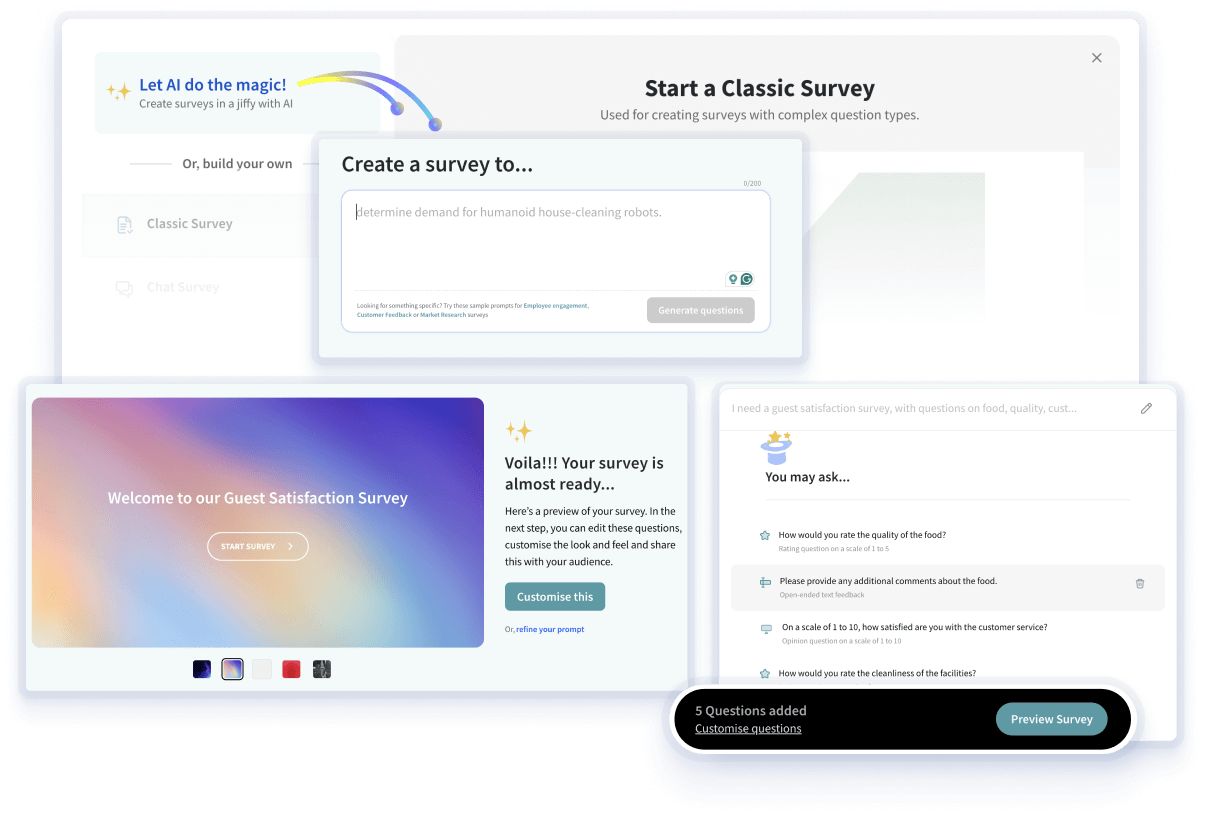
With SurveySparrow’s surveys using AI features, it has been easier for a lot of organizations to build surveys in just a few seconds using AI. All they need to do is enter the prompt, and the survey will be ready for you to brush up on customizing your themes and questions.
Try creating surveys using AI. It’s fun. Create a free account with your email and viola!
14-day free trial • Cancel Anytime • No Credit Card Required • No Strings Attached
How easy is that? There’s more..
👉 Text-Sentiment Analysis
Collecting feedback is fine, but have you ever wondered about deep diving and directing the emotions behind each feedback? A few years back, not many would have believed in the possibility of understanding the real sentiment behind each feedback and acting on it efficiently.
Hold on! It’s possible to use SurveySparrow‘s text analysis.
Many organizations now use the CogniVue feature from SurveySparrow, an AI text analysis tool, to conduct root cause analysis and find hidden insights based on the sentiment score followed by the AI text analysis. Once the analysis is done, AI will generate a key driver analysis that shows insights into customer sentiments.
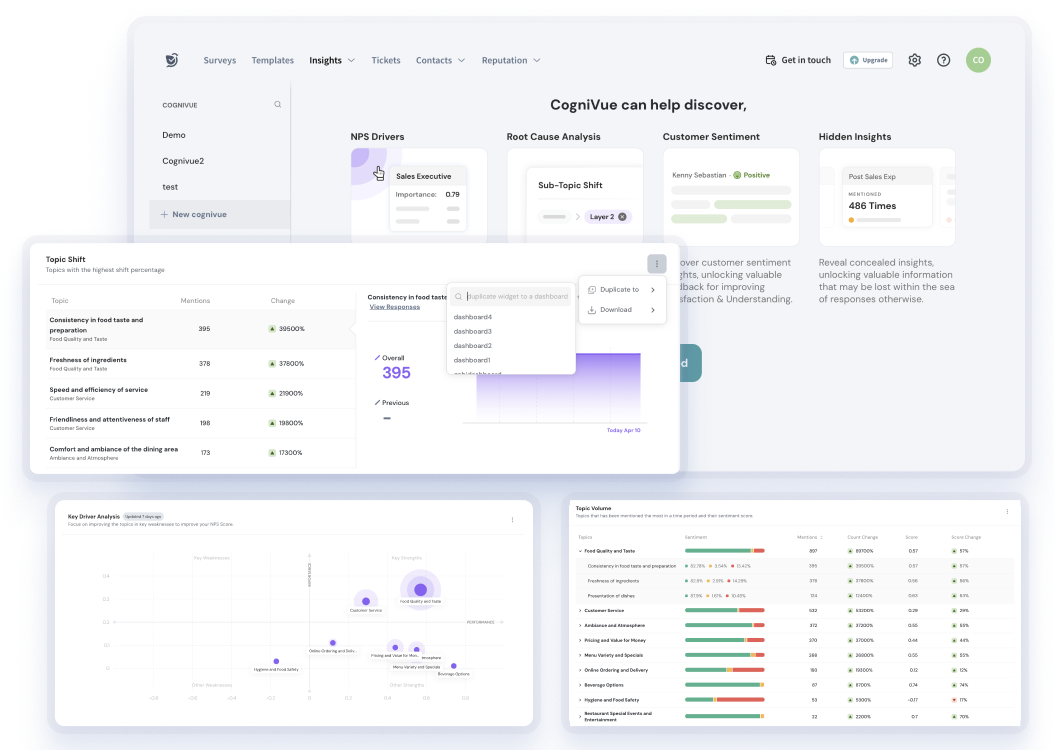
Check how sentiment analysis works. Get free access to the surveys and dashboards now.
14-day free trial • Cancel Anytime • No Credit Card Required • No Strings Attached
2. Amazon’s Product Recommendation System

Amazon has revolutionized e-commerce shopping with its AI-driven product recommendation system.
Amazon’s AI system makes personalized product recommendations by analyzing individual customer behavior, purchase history, items in the shopping cart, and what other customers are buying. This personalization improves the customer’s shopping experience and increases Amazon’s sales.
3. Starbucks’ Predictive Analytics

Starbucks uses AI to enhance its customer experience with the help of a tool called Deep Brew. It uses machine learning and predictive analytics to personalize marketing messages, drive loyalty, and manage store-level inventory.
For example, Deep Brew can suggest menu items based on a customer’s past orders, location, weather, and time of day, among other factors.
4. Sephora’s Virtual Artist App

Sephora, a leading cosmetic retailer, uses AI to improve its customer experience with its Virtual Artist App. This app uses Augmented Reality (AR) to allow customers to virtually “try on” different makeup products.
It scans the customer’s face and lets them see how different products look on their skin. This app helps customers make more informed purchasing decisions and adds a fun, interactive element to online shopping.
These examples show that whether it’s e-commerce, food and beverage, or the cosmetics industry, AI can significantly enhance the customer experience across various sectors.
Top 10 Ways AI Can Improve Customer Experience
1. Personalized Recommendations
AI uses machine learning algorithms to analyze customers’ past behaviors, interests, and preferences. It can identify patterns, such as product preference or buying behavior, and use this information to recommend products or services.
For example, if a customer frequently buys certain types of books, an AI system can recommend similar books they might like. This not only improves the shopping experience for the customer but also increases sales conversions .
2. Chatbots and Virtual Assistants

AI customer service automation is becoming increasingly popular. SurveySparrow hosts incredible AI chatbots and AI-powered surveys that will help companies seamlessly gather customer experience and feedback.
These AI-powered chatbots can answer customer queries, resolve simple issues, and provide information instantly at any time of the day. They can be programmed to answer frequently asked questions, process orders, and even provide personalized product recommendations.
They can also handle large volumes of queries without human intervention, ensuring customer queries are handled swiftly and efficiently. As businesses invest more in AI-driven solutions, understanding AI engineers salary trends becomes crucial for attracting top talent in this competitive field. This is why it is considered one of the most significant examples of AI customer experience.
How about checking out a virtual chatbot? Click to start using it.
Customer Support Chatbot Template
Use This Template3. Voice Assistants and Natural Language Processing
Voice assistants like Siri, Alexa, and Google Assistant powered by advanced AI voices are becoming increasingly popular. They leverage AI’s Natural Language Processing (NLP) capabilities to understand and respond to spoken commands.
These voice assistants can answer questions, place orders, control other devices, and provide personalized assistance based on the user’s history and preferences.
4. Predictive Customer Service
With its ability to analyze large amounts of data, AI can predict future customer behavior… For example, it might predict that a customer will likely run into a problem based on their usage patterns.
The company can then proactively reach out to the customer with a solution or offer additional support, enhancing the customer’s experience with the brand.
5. Advanced Text Analytics
AI algorithms can sift through huge amounts of customer data and find patterns and insights humans may miss. For example, you can check the Text Analysis AI, which we’ve already discussed about from SurveySparrow. This can help identify customers’ wants, anticipate future needs, and highlight areas where the customer experience can be improved.
Similarly, businesses dealing with extensive customer research reports, feedback documents, and market analysis PDFs can benefit from AI-powered document summarization tools to quickly extract key insights and patterns from lengthy materials. However, while these algorithms.
However, while these algorithms facilitate the anticipation of future needs and enhancement of customer experiences, there exists a concern regarding potential risks associated with generative AI.
These risks encompass issues like unintended biases in data, privacy infringements, and the possibility of misleading or manipulative outputs that could impact decision-making processes. Hence, careful monitoring and ethical considerations are crucial to harness the benefits of AI analytics while mitigating these inherent risks.
6. Sentiment Analysis
AI can analyze text from customer reviews, emails, social media posts, and other sources to determine the sentiment behind the words.
This can help businesses understand how customers feel about their products or services and identify areas for improvement.
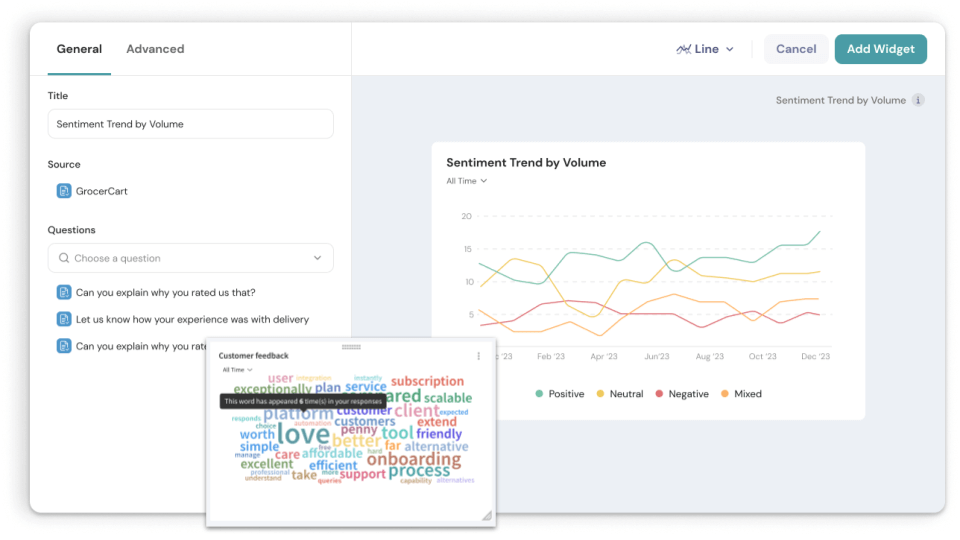

7. Real-Time Personalization
The AI can modify the user experience in real time according to the actions of the customer.
For instance, if a customer is browsing certain types of products on a website, the AI can adjust the site’s content to highlight similar products, creating a highly personalized shopping experience.
8. Seamless Omnichannel Experience
AI can integrate data from diverse sources, including online, in-store, mobile, and social media channels.
This ensures a seamless experience for customers, who can switch between channels and continue their journey without interruption.
9. Customer Segmentation
AI analyzes customer data to create detailed segments based on demographics, behaviors, and preferences.
This helps businesses deliver personalized customer experiences and improve outcomes. This enables businesses to deliver highly targeted marketing campaigns and improve the relevance of their messaging.
10. AI-Powered CRM
An artificial intelligence CRM can significantly enhance customer experience by automating tasks like data entry, lead scoring, and follow-up reminders.
It can also provide intelligent insights, like predicting which leads are most likely to convert, enabling sales teams to focus their efforts more effectively.
The Future of Artificial Intelligence in Customer Experience
Artificial Intelligence is set to play an even larger role in the customer experience as we head into the future. As technology evolves, we can expect several key trends to take shape.
Here are some of the extraordinary prospects of AI in revolutionizing customer experience:
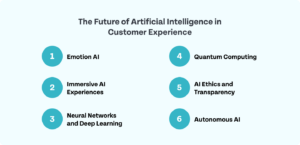
Emotion AI
Artificial Intelligence is poised to transcend mere text and voice recognition; the future holds promise for ‘Emotion AI.’ This AI can comprehend and respond to human emotions expressed via facial cues or tone of voice. Imagine a customer service that understands what you’re saying and how you feel. This will pave the way for truly empathetic customer experiences.
Immersive AI Experiences
With advancements in AR (Augmented Reality) and VR (Virtual Reality), AI can provide immersive customer experiences. Imagine trying clothes on your digital avatar in a VR environment before purchasing or using AR to see how a piece of furniture would look in your room. Businesses looking to leverage this technology can hire virtual reality developers to create engaging, AI-powered AR/VR experiences that redefine customer interaction.
Neural Networks and Deep Learning
These advanced AI systems will enable ultra-intelligent customer experiences. They’ll make sense of unstructured data (like a customer’s social media activity) to provide tailored experiences on another level of personalization.
Quantum Computing
As quantum computing comes into play, the speed at which AI can process customer data and make predictions will be unlike anything we’ve seen. This will allow for real-time personalization and instant responses to customer actions.
AI Ethics and Transparency
As AI becomes more sophisticated, an increased focus will be on making AI ethical and transparent. Customers will better understand how AI processes their data and makes decisions, leading to increased trust in AI-powered customer experiences.
Autonomous AI
AI in will take on a more autonomous role in managing customer experiences. AI agents for customer service will support human agents and act as independent agents, making decisions and taking actions to optimize the customer journey.
AI call centers are set to revolutionize the industry, enabling businesses to handle most interactions autonomously and significantly reduce their reliance on human agents.
In a nutshell, the future of AI in customer experience is not just about making processes faster and more efficient. It’s about creating unique, immersive, and emotionally intelligent interactions that respect the customer’s individuality and autonomy.
It’s about AI becoming an integral part of the business ecosystem, where it understands and anticipates customer needs and values and respects and empathizes with the customer. Truly, we are on the cusp of an extraordinary revolution in customer experience.
Revolutionize AI Customer Experience with SurveySparrow
If you’re eager to harness AI to elevate your customer experience, SurveySparrow is here to support you. With its AI-driven features, SurveySparrow transforms how businesses gather and interpret customer feedback.
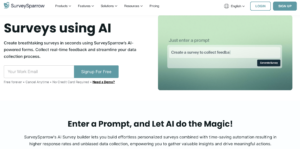
- Dynamic Surveys: AI-driven, adaptive surveys for personalized feedback.
- Predictive Analytics: AI algorithms for trend analysis and customer behavior predictions.
- Data Integration: Connects various customer data sources for enriched insights.
- Real-Time Feedback: Quick capture and response to customer input.
- User-Friendly Design: No-code, customizable survey creation.
- Sentiment Analysis: Advanced tools to gauge customer emotions from feedback.
- Multi-Channel and Multilingual Support: Broad reach across different platforms and languages.
- Automated Workflows: Streamlines processes with CRM and business tool integrations.
Sign up below to try all of these features for free.
14-day free trial • Cancel Anytime • No Credit Card Required • No Strings Attached
Looking for even more ways to level up your AI-driven operations?
Meet SparrowGenie, an AI-powered sales enablement and automation platform from the SurveySparrow family.

SparrowGenie automates repetitive tasks, streamlines sales processes, and captures high-intent leads all within a single, unified dashboard—freeing up sales teams to concentrate on closing real deals instead of getting bogged down in busywork.
Key Features of SparrowGenie
- AI-Driven Automation: Reduces RFP, RFI, and proposal response times from weeks to hours, eliminating repetitive and time-consuming tasks.
- AI Proposal Creation: Generates tailored proposals with minimal input, ensuring teams can deliver precise, high-quality responses faster.
- Streamlined Sales Workflows: Automates each phase of the sales cycle, enabling teams to work more efficiently and focus on closing deals.
- Unified Dashboard: Offers a central hub for managing leads, tracking progress, and generating insights, all in real-time.
- Seamless Integrations: Connects smoothly with CRM systems and other business tools to synchronize data and maintain a cohesive sales ecosystem.
Currently, SparrowGenie is available only by invite, ensuring that every user gets a hands-on onboarding experience and a solution tailored to their needs.
Ready to see how SparrowGenie can amplify your results?
Get Early Access Now! and be among the first to transform your sales process with next-gen AI capabilities.
Wrapping Up
In conclusion, artificial intelligence is no longer a technology of the future – it’s today’s technology shaping our tomorrow. It’s pivotal in enhancing customer experiences, making them more personalized, efficient, and emotionally attuned.
The capacity of AI to analyze vast amounts of data, understand customer behavior and preferences, and predict future trends has become an invaluable asset to businesses across the globe.
However, as we embrace these transformative changes, businesses must focus on ethical and transparent AI use, ensuring that the technology enhances human interaction, not replace it.
The journey of AI in revolutionizing customer experience has just begun. As businesses, it’s our responsibility to harness this power in a way that genuinely values and elevates our customers.
You can sign up for a free trial and learn how SurveySparrow harnesses AI to elevate customer experience. Need a free demo? That’s sorted as well. Here you go!

Make your customers feel heard. Turn feedback into loyalty with SurveySparrow's CX platform.
Jaby K J
Once chasing a half-cooked Ph.D. dream in Literature amidst the stacks of academia, Jaby has successfully pivoted to become a product marketer in the SaaS industry, leveraging a rich background in research and a deep understanding of creating compelling narratives.
Related Articles

Survey
10 Best AI Form Builders to Boost Data Collection with Engaging AI Forms
13 MINUTES
26 August 2023

Survey
AI Tools for Market Research You Must Try in 2024
18 MINUTES
19 January 2026

Customer Experience
What is Customer Lifetime Value & Strategies to Elevate It
16 MINUTES
6 September 2019

Customer Experience
Enhancing Customer Experience with Chatbots: A Comprehensive Guide
9 MINUTES
6 September 2023

Customer Experience
Top 10 Customer Journey Analytics Tools of 2024
16 MINUTES
27 June 2023
